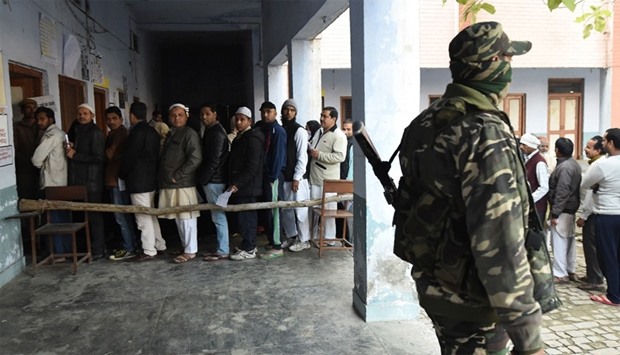Uttar Pradesh is home to over 200 million people -- more than the entire population of Brazil -- and polls there are a bellwether of national politics.
‘All voters must take part in this huge festival of democracy and cast their ballots in big numbers,’ Modi implored on Twitter Saturday.
But this election is also being seen as a referendum on his controversial ban on high-value notes, a move aimed at combating tax evasion by the rich that has hit poor rural communities hard.
The northern state voted overwhelmingly for Modi's Hindu nationalist Bharatiya Janata Party (BJP) in the 2014 general election, powering him to victory over the Congress Party that has dominated Indian politics since independence.
This time around the BJP faces a major challenge from the youthful and charismatic current Chief Minister Akhilesh Yadav, running in an alliance with Congress.
Yadav predicted rural voters would vent their frustration with Modi's banknote ban and deliver the prime minister a ‘big jolt’.
‘Modi must answer the people,’ Yadav told reporters in the state capital Lucknow.
‘His credibility will come into question, and that is why he is panicking.’
There were no initial reports of disturbances but security was tight in Muzaffarnagar, with soldiers deployed to guard the nearly 900 polling stations across the state's western district.
The memory of Hindu-Muslim violence in 2013 that left at least 50 people dead and thousands displaced was fresh in the minds of some voters as they headed to the ballot box.
‘We don't want a repeat of the riots. All we want is peace,’ Mohammed Shahid, 60, told AFP in Muzaffarnagar.
- Pivotal state -
Voting will be staggered over several weeks, with results out on March 11, and pollsters put the BJP neck and neck with Yadav's Samajwadi Party and Congress.
Congress, whose 46-year-old likely next leader Rahul Gandhi has campaigned alongside Yadav, desperately needs a win after a dismal performance in 2014.
Both Modi and Gandhi -- scion of the family that has dominated the party for generations -- have their seats in Uttar Pradesh, underscoring the importance of the electorally pivotal state.
‘The government will be judged on the popularity or lack of popularity of its demonetisation policy in India's most populous state,’ said Ashok Malik, a fellow with think-tank Observer Research Foundation.
‘There will also be other factors at play in these state polls, but Modi's BJP will be judged in comparison to its performance in the state in 2014.’
He cautioned against discounting Mayawati, who goes by only one name and is a low-caste leader known as the ‘Dalit Queen’ whose Bahujan Samaj Party (BSP) was once seen as unassailable in the state.
With so much at stake halfway through his term, Modi has personally led the campaigning for his party.
But some observers said the BJP's failure to put forward a local face could backfire, as it did in the neighbouring state of Bihar in 2015.
‘If it loses UP, it will be this factor that killed its hopes,’ said journalist R. Jagannathan in an opinion piece for the Times of India daily.
‘The electorate knows it will get Akhilesh Yadav as chief minister if the SP-Congress coalition wins, but it is not sure what will emerge from the black box if BJP wins.’

